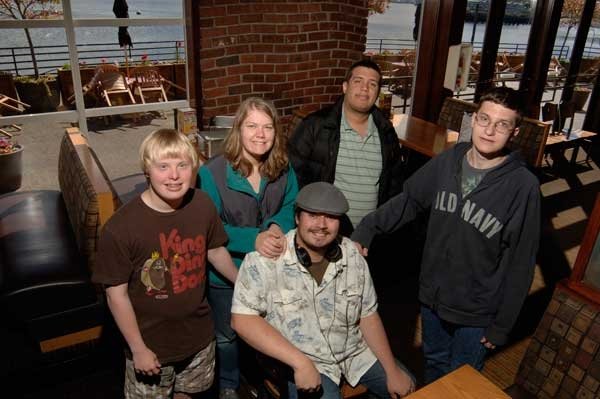 Community Transition Program students, from left, Riley Sullivan, Carlie Shield, Brian McCaughey and Blake Jones, huddle around Morgan Hensley, their crew supervisor (and Key Peninsula resident), moments after finishing work at the Tacoma Ram Family Restaurant. Photo by Scott Turner, KP News
Community Transition Program students, from left, Riley Sullivan, Carlie Shield, Brian McCaughey and Blake Jones, huddle around Morgan Hensley, their crew supervisor (and Key Peninsula resident), moments after finishing work at the Tacoma Ram Family Restaurant. Photo by Scott Turner, KP News
For seven special education students who live on the Key Peninsula, the Peninsula School District’s Community Transition Program (CTP) plays an important role in their future.
Josh Burkey, Jesse Smith, Cole Martin, Jacob Sumpter, Andrea Moulton, Morgan Hensley and Rebecka Miller are among the students benefitting from the program.
According to Doris Walden, a CTP teacher, the program is available for all students in the district’s special education program who have completed their high school training, but still need more services.
“CTP was founded more than 25 years ago by Edie Purvis,” Walden said. “She had a vision that these 18- to 21-year-olds with developmental disabilities can do more than just sit around. She thought they should be out in the community working and becoming more independent.”
Basically, Walden said, CTP is a continuation of high school. “It helps the students learn how to get a job and teaches them good work habits and personal skills –– any skills that they need for transition into the community.”
One of the biggest benefits of the program is its connection with area businesses that hire CTP students as workers.
“We’re very fortunate to have jobs available at places like the Ram, Tanglewood Bar & Grill and Burki’s Chiropractic,” Walden said.
Other businesses that employ CTP students include Sound Vista Village, Round Table Pizza, Peninsula Pediatric Therapy and Dex or Yellow Book.
The students also do volunteer work at FISH, MDA and other locations, Walden said.
They do tasks such as rolling silverware at restaurants, office cleaning, sorting and shelving items and landscape services.
“The whole goal is that students become sustainable members of the community, working full-or part-time for minimum wage, or they can do volunteer work,” she said.
One of the biggest challenges for Key Peninsula students is transportation.
“There are no buses out here on the Key and most of these young people don’t drive or have access to other transportation,” she said. “It would be very helpful if there were more job opportunities out here for the students, because once they leave our program they might not have access to jobs elsewhere,” Walden said.
Morgan Hensley, a 20-year-old CTP student from Lakebay, agreed that transportation is a big problem.
After completing his regular studies at Peninsula High School, Hensley joined the CTP program.
“It has really helped me a lot. They helped me get a job and showed me how to use the buses,” Hensley said. “I really like the program and it’s definitely working. Everyone is very nice and very helpful.
“But the biggest problem is the bus system. I wish there were more buses here on the Peninsula,” he said. “I don’t drive, so I depend on my family or on the buses. When I get out of the program next year, I’ll probably move to Gig Harbor and hopefully get a job there where I can get around better.”
Michael Francis, manager of the Tacoma Ram Family Restaurant, is a long-time supporter of the CTP program.
“It’s a very important program. It teaches discipline and motor skills and how to do a job in a real-life environment,” he said.
As a restaurant manager, he recognized the program’s economic benefits, as well.
“It really helps me keep my labor costs down because I can shift tasks like rolling silverware from my servers to this (CTP) team,” he said. “At the Ram, we pay for it out of our training budget, but it’s not costly and it’s very worthwhile.”
Having a steady job with a regular paycheck also teaches the students about money, Walden added. “They get a paycheck every month, so they learn about banking and how to budget and manage money.”
For the students and the businesses that employ them, the CTP program is a win-win situation.
“We really need more businesses out on the Key. That’s what would really help,” Walden said.
For information, call (253) 530-3943.
UNDERWRITTEN BY THE FUND FOR NONPROFIT NEWS (NEWSMATCH) AT THE MIAMI FOUNDATION, THE ANGEL GUILD, ADVERTISERS, DONORS AND PEOPLE WHO SUPPORT INDEPENDENT, NONPROFIT LOCAL NEWS